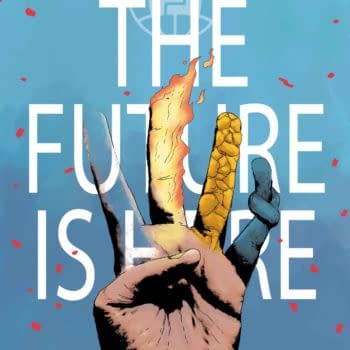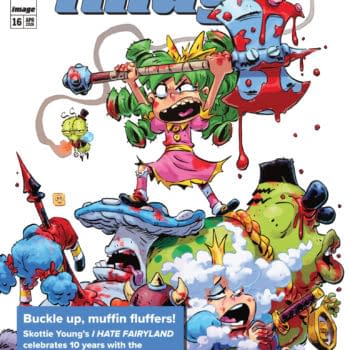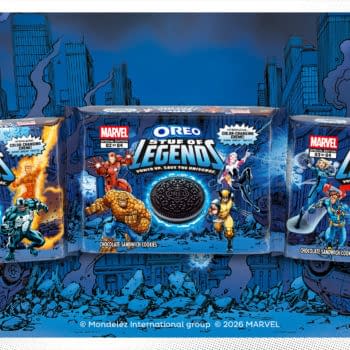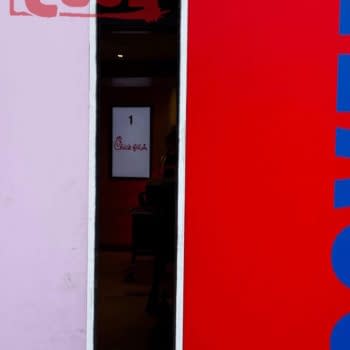Posted in: Books, Pop Culture | Tagged: china, chris fenton, world's strongest man
Why On Earth Was The World's Strongest Man Held In Chengdu, China?
Chris Fenton was president of the China-based DMG Entertainment Motion Picture Group, General Manager of DMG North America (owners of Valiant Comics), and Senior Advisor to IDW Media Holdings. He has now written a book, Feeding The Dragon, looking at his career, getting American movies into Chinese markets, notably Looper and Iron Man 3. I recently read it, and it made for quite the page-turner, and there are so many nuggets to share. You can follow along with a few I wrote with this tag. But he also spilled the beans on the move of The World's Strongest Man competition to the relatively unknown city of Chengdu in China – and how it informed a number of his productions that followed. And talking with Geoff Cochrane, Senior Production Executive at IMG/TWI.
I convinced Geoff, a friend from my days at Cornell and part of my Rolodex's earlier entries, and his team to shoot the competition for the first time ever in China. At first, the plan was to film it in Beijing, selling the idea of competitions on the Great Wall and in the Forbidden City. However, with the 2008 Summer Olympics approaching in a few years, Beijing didn't really need international exposure. As a result, the city's offer of incentives was lacking. Beijing showed little enthusiasm. The Olympics inspired their city. A Strongman Competition did not.
We expected other cities would react differently. Most would jump at the chance to host anything that offered international exposure. And they did. Ultimately, the best city for The World's Strongest Man was Chengdu. They offered the most. Though barely known by anyone outside of China, Chengdu did have a population of almost ten million. And more importantly, it was home to China's famous pandas, some of which I got to spend time with personally—pandas do love a nice belly rub!
Pandas also pioneered modern-day international diplomacy. They symbolized the ultimate in cultural exchange. Everyone truly loves pandas. And pandas loaned by China to various countries fostered amazing alliances over the years.
Chengdu's offer included hundreds of free hotel rooms, hundreds of police and military personnel, meals for the crew, VIP tours, special access, free production location access and facilities, free laborers, free equipment, and so on. The municipal authorities fought hard for the event. Their passion to showcase their city, which had just been completely modernized through government initiatives and private sector partnerships with companies like Intel, was super convincing.
But how did they sell it into the local audience?
Getting the Strongman Competition to attract forty million viewers was no easy feat. We had to make people want to watch it. And to do that, we needed people the Chinese could identify with. That surely wasn't a bunch of massive musclemen from Eastern Europe. Instead, we needed a Chinese strongman—one who could respectfully compete. He would be the key to local relevancy. If our Chinese contestant was eliminated early, our viewership numbers would plummet instantly. A Chinese competitor, who was able to compete at the level of the massive Eastern Europeans who typically dominated the show, was optimal. But that was a very tall task. Finding a Chinese guy as big as the European competitors was almost impossible. There are not that many six-foot-six, 380-pound muscular Chinese. And tracking down a local with the learned skills to tow an eighteen-wheeler a hundred yards was a challenge.
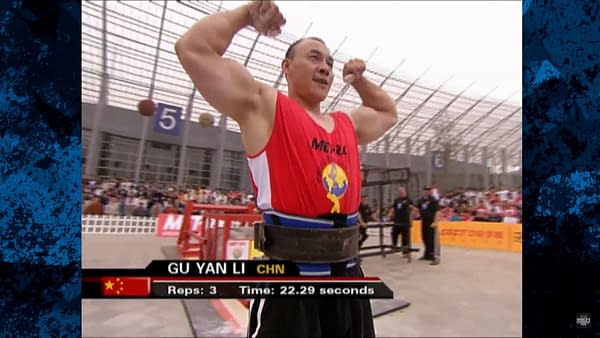
We did a "Search for the Chinese Strongman" competition several months in advance. It was quite a spectacle in itself, and through it, we found our guy—Gu Yanli. Immediately we started to transform him into a national hero, allowing the televised competition to ride on his shoulders. He wasn't the perfect candidate, but he had the potential to be our Rod Tidwell. Gu grew up in the rice fields of a sparsely populated area in Western China. Gu was strong, but more importantly, he was extremely charismatic. That alone made up for his relatively small size in comparison to the competition. He also didn't have the technique like the Eastern Europeans, so cracking a beaming smile and being quick with a joke came in very handy. Our creative team came up with a solution to keep the charismatic Gu in the show, knowing his early elimination was inevitable. He'd play into a forced, made-for-television, mentor/protégé relationship— another culturally relevant touchpoint. Gu filled the role as protégé, and a fantastically charismatic American competitor, Jesse Marunde, acted as his mentor. We picked Jesse because he had a great chance of winning the event too, meaning he'd be competing for the run of the show. That way, when Gu was eliminated from the competition in the early rounds, we could still have him on screen, cheering his mentor on throughout the rest of the competition.
Which is just what happened.
Sadly, Gu was eliminated later that day. It happened during the Ding-Carrying Competition, a Chinese-invented event that became part of the overall competition. Steeped in the history of China, a ding is a large, extremely heavy iron or bronze bowl that stands on only three legs. The three legs are positioned to create maximum stability and symbolize the coming together of three tribes of ancient China, joining forces under a central and all-powerful emperor. In short, the ding is an ancient symbol for unity.
Our creative team felt the symbolic and heavy ding would create much better relevancy for the Chinese audience. Typically, a full keg of beer was the object used for that event. Watching the strongmen come from all around the world to carry such an amazing and authentic piece of the country's lore was exciting, important, and relevant. Carrying a keg of beer was not. Audiences proved our theory too. Our Chinese broadcast partner CCTV5 posted record numbers each night during the show's airing, and the viewership grew steadily throughout the two-week competition.
Even with Gu eliminated, the significance of the show was continuously reinforced. The ding was just one example. Even better, Gu stayed on camera until the very end, cheering on his mentor at every moment. As a result, our overly enthusiastic crowds did the same. If Gu wanted his mentor to win, so did they!
And the show had found a new audience. Forty million of them.
The results were some of the highest holiday-period ratings ever for CCTV5, the Chinese equivalent of ESPN. Eighty-six hours of total television, over fifteen straight days, both on CCTV5 and Chengdu Provincial Television. It was the top national sports story over the run of the program and an amazing accomplishment considering the
massive sports interest of China in general. Our Western partners ESPN, IMG, and TWI all called it, by far, the greatest World's Strongest Man competition ever. And, our Chinese broadcast partners still marvel at the fact that we could shoot a competition using two separate and distinct camera crews, one focused solely on English-language
announcers with Western background sponsors, and the other focused solely on Chinese announcers with Chinese background sponsors, simultaneously.
With Geoff calling to congratulate,
"Insane. That's all I can say. You guys got us a bigger audience in one single night, in one single market, than we have gotten in total over twenty-five years of airing the show globally!" Geoff Cochrane, Senior Production Executive at IMG/TWI, exclaimed when it was all said and done.









